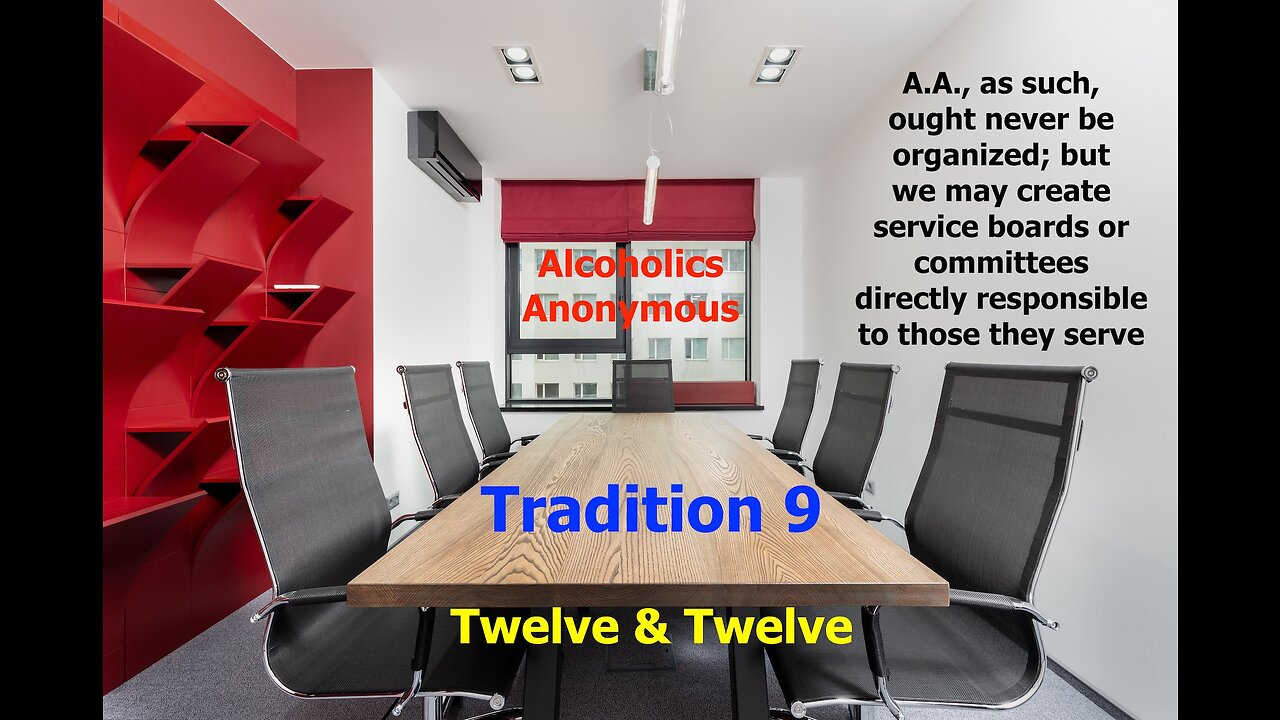Premium Only Content

AA - Tradition 9 - Twelve Steps & Twelve Traditions - Alcoholics Anonymous - Read Along – 12 & 12
Tradition 9 - Twelve Steps & Twelve Traditions - Alcoholics Anonymous - 12 & 12 Read Along
The Life-Changing Twelve Step Solution to Alcoholism
If you or someone you care about is suffering from addiction, there is help available.
Are you trying to stop drinking?
Do you think you may be an alcoholic?
Alcoholics Anonymous has been successful in saving millions of lives and families.
Local meetings can be found online.
Reach out if you would like assistance.
Spiritual principles helping to live your best life without alcohol and drugs.
Recovery from unhealthy habits and creating solutions for a long happy and useful life.
Alcoholism doesn't have to be a death sentence.
Addiction can be fixed.
Interventions and sober coaching
Tradition Nine
“A.A., as such, ought never be organized; but we may create service boards or committees directly responsible to those they serve.”
WHEN Tradition Nine was first written, it said that “Alcoholics Anonymous needs the least possible organization.” In years since then, we have changed our minds about that. Today, we are able to say with assurance that Alcoholics Anonymous—A.A. as a whole—should never be organized at all. Then, in seeming contradiction, we proceed to create special service boards and committees which in themselves are organized. How, then, can we have an unorganized movement which can and does create a service organization for itself? Scanning this puzzler, people say, “What do they mean, no organization?”
Well, let's see. Did anyone ever hear of a nation, a church, a political party, even a benevolent association that had no membership rules? Did anyone ever hear of a society which couldn't somehow discipline its members and enforce obedience to necessary rules and regulations? Doesn't nearly every society on earth give authority to some of its members to impose obedience upon the rest and to punish or expel offenders? Therefore, every nation, in fact every form of society, has to be a government administered by human beings. Power to direct or govern is the essence of organization everywhere.
Yet Alcoholics Anonymous is an exception. It does not conform to this pattern. Neither its General Service Conference, its Foundation Board,* nor the humblest group committee can issue a single directive to an A.A. member and make it stick, let alone mete out any punishment. We've tried it lots of times, but utter failure is always the result. Groups have tried to expel members, but the banished have come back to sit in the meeting place, saying, “This is life for us; you can't keep us out.” Committees have instructed many an A.A. to stop working on a chronic backslider, only to be told: “How I do my Twelfth Step work is my business. Who are you to judge?” This doesn't mean an A.A. won't take advice or suggestions from more experienced members, but he surely won't take orders. Who is more unpopular than the oldtime A.A., full of wisdom, who moves to another area and tries to tell the group there how to run its business? He and all like him who “view with alarm for the good of A.A.” meet the most stubborn resistance or, worse still, laughter.
You might think A.A.'s headquarters in New York would be an exception. Surely, the people there would have to have some authority. But long ago, trustees and staff members alike found they could do no more than make suggestions, and very mild ones at that. They even had to coin a couple of sentences which still go into half the letters they write: “Of course, you are at perfect liberty to handle this matter any way you please. But the majority experience in A.A. does seem to suggest . . .” Now, that attitude is far removed from central government, isn't it? We recognize that alcoholics can't be dictated to—individually or collectively.
Just as the aim of each A.A. member is personal sobriety, the aim of our services is to bring sobriety within reach of all who want it. If nobody does the group's chores, if the area's telephone rings unanswered, if we do not reply to our mail, then A.A. as we know it would stop. Our communications lines with those who need our help would be broken.
A.A. has to function, but at the same time it must avoid those dangers of great wealth, prestige, and entrenched power which necessarily tempt other societies. Though Tradition Nine at first sight seems to deal with a purely practical matter, in its actual operation it discloses a society without organization, animated only by the spirit of service —a true fellowship.
-
 1:35:15
1:35:15
Man in America
13 hours ago🚨 ALERT: Hospitals in the U.S. Are KILLING Patients… for Their Organs!
73K31 -
 8:00
8:00
DropItLikeItsScott
14 hours agoIs This The BEST SIG P365? SIG P365 FUSE
1.12K -
 11:55
11:55
The Shannon Joy Show
13 hours ago🔥Babies Aborted for Cash.🔥
2.14K -
 6:24
6:24
Zach Humphries
14 hours agoBreaking Crypto News on Crypto Regulation!
3.92K2 -
 15:41
15:41
BaldBrad
15 hours agoDeclassified BOMBSHELL: CIA Lied About Trump-Russia! Putin Never Backed Trump | Russiagate Exposed
3.67K4 -
 13:07
13:07
Nate The Lawyer
16 hours ago $0.70 earnedWNBA Loses $500M But Players Want More Money. $40M Lost Last Year.
5.49K6 -
 11:43
11:43
Zoufry
17 hours agoThe McDonald's Ice Cream Machine Conspiracy
5.19K2 -
 14:54
14:54
DeVory Darkins
1 day ago $4.97 earnedTrump just announced MAJOR TRADE deal as CNN confronts Khalil over gaza
13.2K48 -
 2:09:26
2:09:26
Side Scrollers Podcast
20 hours agoSplitgate 2 Reverses Course, Ubisoft Failures, RIP Julian LeFay | Side Scrollers
101K5 -
 17:01
17:01
GritsGG
15 hours agoAttempting World Record Win Streak! 18 of 71!
11.1K2